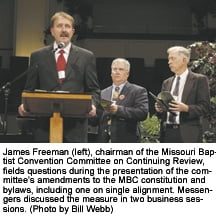By Vicki Brown
Word&Way News Writer
Raytown — Messengers to the Missouri Baptist Convention annual meeting Oct. 25-27 approved a report to consider constitutional changes next year that would tighten membership requirements. They also approved another amendment to the MBC Constitution.

The items were part of a report by the Committee on Continuing Review. Proposed constitutional amendments on membership in the MBC also included in the report drew considerable debate.
In its report, the committee recommended four constitutional amendments and rules and procedures for committee operation for messengers to consider and vote on at the 2005 annual meeting.
One proposed amendment would change Section 1 of the constitution's membership article to change wording from "any Baptist church" to "any Southern Baptist church" and to include the words "singly aligned" with the convention. No church could be an MBC church without being a cooperating SBC church.
Speaking for the proposal, committee chairman James Freeman quoted from Jeremiah 14 and noted that the change "draws a fine line between the precious and the worthless."
David Overman of Park Hill Baptist Church said he believes the wording changes would put "divisions into the body that do not need to be there."
When a messenger from Pleasant Ridge Baptist Church, Harrisonville, asked for a definition of single alignment, Freeman responded that Section 4 of the membership article "would help determine" the definition, but that "ultimately it would be determined by messengers if a challenge was brought to the floor."
That section notes that the membership article would not "prohibit cooperation with the convention" by Baptist churches that have racial, ethnic or cultural ties to other organizations, unless the relationship violates the MBC Constitution, bylaws or business plan or "accepted Southern Baptist faith, polity and practice."
Freeman also noted that the convention would have the right to examine churches' contributions to determine whether congregations support other national or state conventions or other bodies that act as national or state conventions.
Messengers voted down a motion to add wording to Section 4 to prohibit the MBC from sponsoring new church plants that also accept funds from outside groups that are not recognized by the convention.
The committee proposed eliminating Section 4 from the constitution's article on committees. Under that section, the credentials committee is appointed 30 days before an annual meeting and only functions until that session ends.
A proposed amendment to the convention's bylaws would add the credentials committee as a standing body. As proposed, the committee would operate year-round and would "review and make recommendation" on any questions regarding affiliation or messenger credentials.
Proposed committee rules and procedures, also to be considered in 2005, outline guidelines for the committee to use. Under the guidelines, the committee will recognize as Southern Baptist churches those that have adopted a doctrinal statement that reflects "historical Southern Baptist faith, polity and practice," that financially support the work of the Southern Baptist Convention, and that do not send representatives, financially support or budget funds to other national conventions or organizations that act as national conventions.
Under the proposed rules, a church must also contribute to the work of the MBC and must not belong or contribute to any other state convention or to any organization that acts as a state convention.
Congregations must be recognized as SBC churches to be considered as MBC churches. However, churches not recognized by the MBC can be affiliated with the SBC as long as they meet SBC requirements.
The guidelines allow the committee to investigate the qualifications of a church or of any individual named as a messenger. When questioned whether a church could be disqualified if its members are allowed to designate their offerings to other groups, Freeman noted that a designation by a member would not be considered "a church action."
The report also recommends a constitutional amendment that will allow the MBC president to serve for two consecutive terms. Currently the constitution allows only one term.
Several attempts were made to refer the report back to the committee, but Freeman and parliamentarian Michael Whitehead noted that the report only had to be read at the annual meeting. Regardless of whether messengers approved its report, the committee's recommendations on constitutional and bylaw changes would be brought to the 2005 annual session for adoption.
Gary Snowden, a messenger from First Baptist Church, Lee's Summit, objected to the "tenor" of the report and of an article in The Pathway in which Freeman described churches that disagreed with changes as "unchristian, morally impure, Baptist in name only and heretical."
Taking a point of personal privilege after messengers approved the report, Freeman apologized if he had caused offense for quoting the Jeremiah passage and comments in The Pathway. He said both were directed to doctrinal purity and not to the Cooperative Baptist Fellowship or "any other group or individual."
Messengers adopted an amendment to Article VI to allow an MBC officer filling an unexpired term to be eligible to be elected to the same office the following year. The amendment was proposed in 2003.
Under the earlier version, an officer could not succeed himself or herself. For example, Monte Shinkle stepped up as MBC president for 2003 when elected president Kenny Qualls gave up the post to become an associate executive director for the convention. Shinkle could not be elected president for 2004 because the constitution did not allow officers to succeed themselves.
Messengers approved the committee's recommendation to amend the MBC's business and financial plan to report convention receipts at least semi-annually in The Pathway. The recommendation changed the requirement from reporting quarterly. That amendment did not require a second reading.
(See the Nov. 4, 2004, edition of Word&Way for additional annual meeting coverage.)
